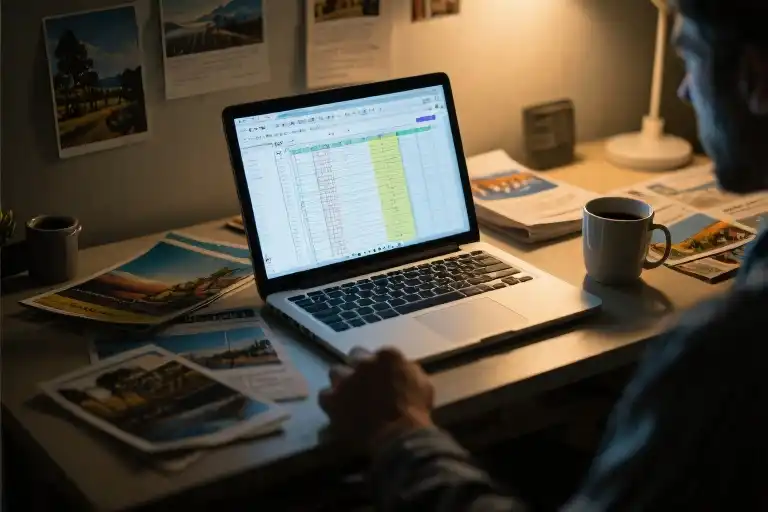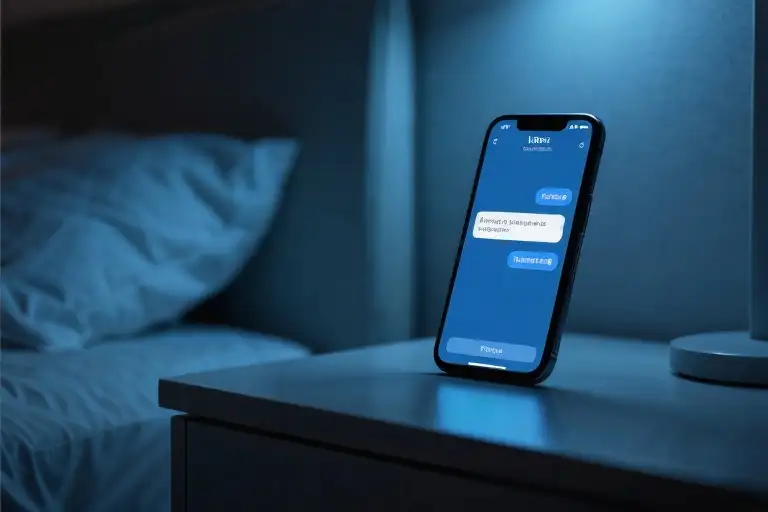The 37th Dishwasher War of Our Relationship began like all the others – with me confidently stacking plates in what I considered ‘logical spatial efficiency,’ and her hovering nearby with that particular eyebrow twitch I’ve learned to recognize as the precursor to diplomatic relations breaking down. This time though, she escalated to full nuclear option: pulling out a hand-drawn diagram of ‘correct’ utensil placement from her back pocket. At that moment, I realized I wasn’t just loading dishes; I was trespassing on sacred territory.
They don’t give out PhDs for this kind of relationship expertise, but if they did, I’d be the overqualified guy giving the commencement speech. Not because I got everything right – quite the opposite. My credentials come from spectacular failures, the kind that should come with warning labels for future generations. Like the time I took ‘I’m fine’ at face value and went golfing (spoiler: she wasn’t fine), or when I thought ‘we don’t need gifts’ applied to Valentine’s Day (the couch still bears the imprint of my regret).
What you’re getting here isn’t some polished relationship guru advice. Consider this more like a field guide from someone who’s crawled through the trenches of domestic misadventures, complete with all the bruises and epiphanies collected along the way. These are the mistakes that nearly left me couch-surfing at my brother’s place – the lessons learned through what experts might call ‘the hard way,’ but what I call ‘how not to become a cautionary tale.’
The beautiful mess of long-term relationships isn’t about avoiding conflicts – it’s about surviving them with enough grace to laugh afterward. Like realizing that dishwasher arguments aren’t about cleanliness standards, but about the invisible blueprints of how we think homes should operate, inherited from parents we didn’t realize were still sitting at our kitchen tables. Or decoding that ‘fine’ isn’t an adjective but a four-alarm fire drill in emotional shorthand.
What follows isn’t a manifesto on perfect partnership. It’s the collected wisdom of someone who turned relationship fails into something resembling progress – wobbly, imperfect progress where the dishwasher might still get reloaded behind my back, but now we both pretend not to notice. Consider these your cheat codes to skip past the worst of it, straight to the part where you’re still allowed to sleep in your own bed.
The Great Dishwasher War of 2022
It started as an ordinary Thursday evening. I was loading the dishwasher after dinner – my self-assigned chore – feeling rather pleased with my spatial efficiency. Plates at perfect angles, bowls stacked like Russian dolls, forks standing at attention. An engineering marvel, really. Then she walked in.
Her silence spoke volumes. That particular brand of quiet where you can actually hear eyebrows rising. “You’re… doing it wrong,” she finally said, fingers twitching near the silverware basket.
What followed was our 37th dishwasher-related cold war. For three days, we moved around the kitchen like rival spies, each secretly rearranging the loading patterns when the other wasn’t looking. I’d find my carefully organized utensil rack mysteriously reconfigured; she’d discover her “proper” glass arrangement altered to fit my “illogical” coffee mugs. Our kitchen became a demilitarized zone where spoons were soldiers and coffee stains were battle scars.
The Turning Point
The breakthrough came during an awkward family dinner when her mother casually mentioned their household’s “dishwasher rules” from childhood. Suddenly, it clicked – those precise spacing requirements weren’t about cleanliness, but about recreating the order her chaotic childhood home lacked. What I’d dismissed as nitpicking was actually emotional archaeology.
The Peace Treaty
Now? We have a “Dishwasher Loading Convention” magneted to our fridge, complete with hand-drawn diagrams that would make an IKEA manual look primitive. Section 3.2 specifically addresses my tendency to “overstack like a Tetris champion.” I’ve learned to ask before rearranging, and she’s accepted that sometimes, just sometimes, my space-saving hacks aren’t personal attacks.
Here’s what this appliance arms race taught me about long-term relationships:
- Household habits are emotional fingerprints – The way we load dishwashers, fold towels, or organize spices often carries invisible histories
- Efficiency isn’t always the priority – My “logical” approach ignored the emotional comfort of routine
- Compromise looks silly on paper – Our fridge treaty includes ridiculous clauses (“No vertical plate stacking after 9PM”) that somehow work
The dishwasher stopped being a battleground when we started seeing it as a translation device – helping decode each other’s unspoken needs. Though I’ll admit, I still occasionally catch her discreetly rotating my “improperly” angled wine glasses when she thinks I’m not looking. Love, it seems, is allowing someone to rearrange your kitchenware while pretending not to notice.
When “I’m Fine” Really Means “We Need to Talk”
It happened on a Tuesday night. The dishes were done, the TV was playing some forgettable reality show, and I was mentally preparing my argument for why the Lakers would never win another championship. Then she said it – those two little words that should be simple but never are: “I’m fine.”
At that moment, I made the classic male miscalculation. I took the words at face value. No microexpressions were analyzed, no tonal variations considered. The sentence entered my ears, traveled to the language processing center of my brain, and was immediately filed under “Non-Emergency.” I nodded, grabbed my phone to check basketball stats, and effectively signed my own relationship death warrant.
Three days later, I accidentally saw her phone light up with a message from her best friend: “Still mad about Tuesday?” followed by a string of angry emojis. That’s when I realized – I’d failed the most basic test of relationship communication. What seemed like a simple statement was actually a complex emotional Morse code.
The Anatomy of an “I’m Fine”
Through painful trial and error (mostly error), I’ve learned that “I’m fine” exists on a spectrum. At one end is Actual Fine – rare but glorious. At the other end is Defcon 1 Emotional Meltdown. The key is recognizing where on that spectrum any given “fine” lands. Here’s what I missed that Tuesday night:
- The Tone Tell: Her voice had that particular flatness, like someone trying to sound normal while holding back tears.
- The Microexpression Flash: That 0.2-second eyebrow twitch I dismissed as tiredness was actually distress signaling.
- The Context Clues: We’d just had a conversation about holiday plans with my family – a known stress point.
The Three-Stage Survival Guide
After the Great Tuesday Misunderstanding (and subsequent couch exile), I developed what I now call the Triple-Check System:
- Vocal Analysis: Is the pitch slightly higher than normal? Are words clipped? These are the auditory equivalent of flashing warning lights.
- Physical Scan: Crossed arms? Jaw tension? That specific way women tighten their ponytail when frustrated? All red flags.
- Environmental Audit: What happened in the 30 minutes before the “fine”? Any unresolved arguments or stressful events lurking in the background?
It’s not foolproof. Sometimes a cigar is just a cigar, and sometimes “I’m fine” really does mean everything’s okay. But applying this system has reduced my relationship emergencies by about 70%. The remaining 30%? Well, nobody’s perfect.
What finally saved me after the Tuesday incident wasn’t some grand romantic gesture. It was sitting down and saying, “Hey, about the other night – I think I missed something. Want to tell me what was really going on?” And then – this is crucial – actually listening to the answer without getting defensive.
Because here’s the uncomfortable truth: When she says “I’m fine” and she’s not, it’s usually because previous attempts to communicate were met with dismissal or defensiveness. The “fine” is both a test and a protection mechanism. Pass the test by showing genuine concern, and you’ll start hearing fewer cryptic “fines” and more honest conversations.
Of course, some days you’ll still misread the signals. I certainly do. But now when my partner says “I’m fine,” I at least know to pause the basketball debate and pay attention. Progress, not perfection.
The Socially Deadly Gift of a Practical Man
Valentine’s Day should have been simple. Flowers, chocolates, maybe dinner at that Italian place she likes. But somewhere between my pragmatic brain and the blinking cursor on the fitness equipment website, things went terribly wrong. I still remember the way her smile froze when she unwrapped that high-end resistance band set – the one with the instructional DVD and ’30-Day Booty Challenge’ program. The silence that followed could have powered a small city.
Here’s what went through my mind at the time: 1) She’d mentioned wanting to tone up before summer 2) This was useful 3) It cost three times what flowers would have. Check, check, and check. What my male brain spectacularly failed to compute was the unspoken Valentine’s Day contract: this day isn’t about utility. It’s about velvet boxes, handwritten notes, and gestures that make absolutely no logical sense whatsoever.
The fallout was… educational. I became a case study in our friend group’s group chat (yes, I saw the screenshots). My defense – “But it’s the professional grade one!” – only fueled what I now refer to as The Great Pinterest Revelation. While helping her set up a new laptop weeks later, I stumbled upon her secret ‘Dream Gifts’ board. Two hundred and seventeen meticulously curated pins of delicate jewelry, handwritten love notes in vintage frames, and exactly zero pieces of exercise equipment.
This was my relationship Rosetta Stone moment. What I’d dismissed as ‘illogical romance stuff’ was actually a carefully coded language I’d never bothered to learn. Those impractical gifts? They translate to ‘I pay attention to your unspoken desires.’ The time spent choosing them? It whispers ‘You’re worth more than efficiency.’ My perfectly practical resistance bands? They screamed ‘I think your butt needs work.’
Now I maintain what I’ve dubbed the Gift Intelligence Database – a running list in my phone’s notes app that includes:
- Every time her eyes linger on a store window display
- Casual mentions of childhood gifts she loved
- Screenshots of her Instagram saves (with permission, after full disclosure of my earlier espionage)
The funny thing? Once I started speaking this ‘illogical’ language fluently, I noticed she began appreciating my practicality in other areas. Turns out relationship currencies are exchangeable – but only after you’ve made sufficient deposits in the right emotional bank account.
Here’s what lives in my notes app now under ‘Never Again’:
- Anything with the words ‘fitness challenge’ as a romantic gift
- Assuming ‘useful’ equals ‘thoughtful’
- Forgetting that sometimes love should be embarrassingly impractical
The resistance bands? We laugh about them now. She uses them for doorframe exercises while I cook dinner – her idea of a perfect compromise. And yes, I’ve learned to appreciate the irony that my most practical relationship tool turned out to be a database tracking decidedly impractical gestures.
The Art of Relationship Survival
Relationships aren’t about perfection – they’re about learning how to navigate the dishwasher wars and emerge with your dignity (mostly) intact. After years of conducting field research in the dangerous territory of long-term partnerships, I’ve come to understand that true compatibility isn’t the absence of conflict, but rather developing the survival skills to climb out of self-created relationship ditches.
That moment when you realize loading silverware facing different directions has somehow become a metaphor for your entire relationship? Yeah, I’ve been there. The great dishwasher protocol dispute of 2019 nearly ended in a permanent separation of kitchenware (and us). What began as an innocent attempt to maximize space efficiency turned into a three-day standoff complete with passive-aggressive plate rearranging. It wasn’t until I noticed her mother’s identical loading technique during a family visit that the lightbulb flickered on – this wasn’t about dishes at all, but about preserving childhood notions of order in an unpredictable world.
Modern dating advice for men often focuses on grand romantic gestures, but the real battlegrounds emerge in these mundane moments. The way she insists on folding fitted sheets (witchcraft), your questionable habit of leaving one sock perpetually missing (how?), or the great thermostat war (sweater weather vs. Arctic tundra preferences). These become the secret handshakes of long-term intimacy – the private language couples develop through years of peaceful negotiations and outright surrenders.
What I wish I’d understood earlier: relationship mistakes men make often stem from approaching partnership like a problem to solve rather than a dance to learn. My engineering brain wanted dishwasher optimization algorithms when what she needed was acknowledgment that her way mattered. The solution wasn’t proving my method held more forks (though it totally did), but creating space for both approaches – hence the now-famous “Dishwasher Peace Accord” taped to our fridge, complete with compromise zones and alternating loading rights.
Here’s the uncomfortable truth nobody mentions in romantic comedies: love isn’t about finding someone who never annoys you, but choosing to be mildly infuriated by the same person for decades. The magic happens in those wobbly moments when you’re simultaneously exasperated and devoted – like when you bite your tongue watching her “organize” your carefully arranged garage tools, or when she pretends not to notice you sneaking the trash out without recycling separation (again).
So to all the fellow relationship adventurers out there: your most ridiculous arguments aren’t signs of impending doom, but proof you’re doing the messy work of merging lives. That time you nearly came to blows over proper toilet paper orientation? Future comedy gold. The heated debate about whether a hot dog qualifies as a sandwich? Relationship lore in the making.
Which brings me to you – what’s your most absurd relationship battle? The kind you’d never admit to coworkers but secretly know deserves its own Wikipedia entry? (Confession: ours involves a two-hour debate about whether penguins have knees. Spoiler: we’re both wrong.) Share your stories – we promise only sympathetic laughter and possibly some terrible advice from someone who’s clearly still figuring this out.





